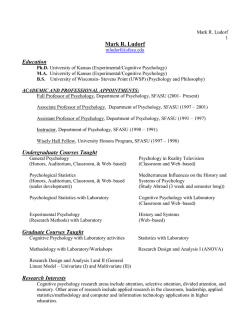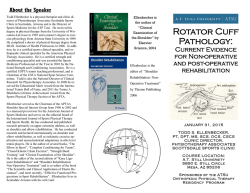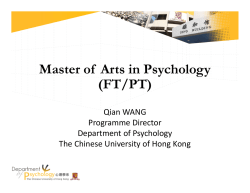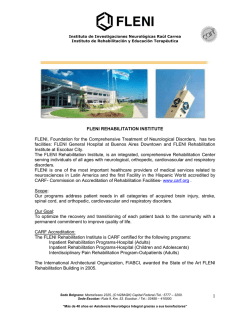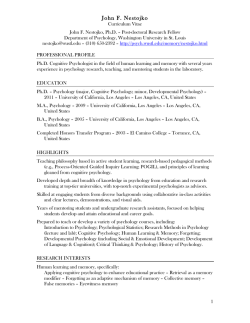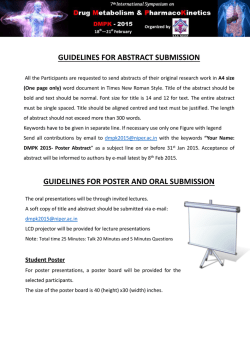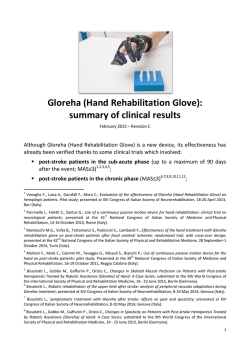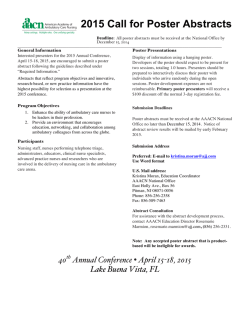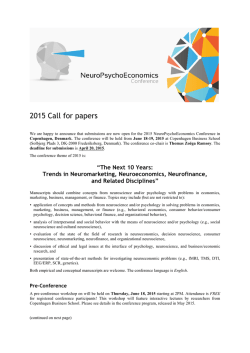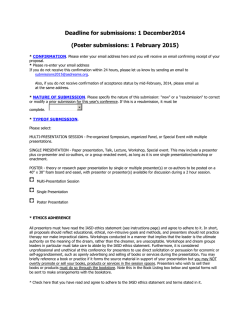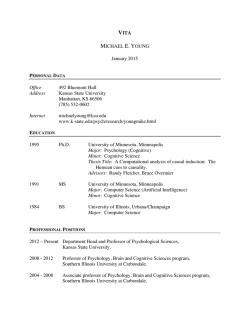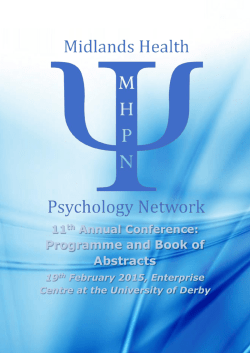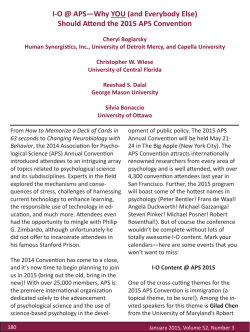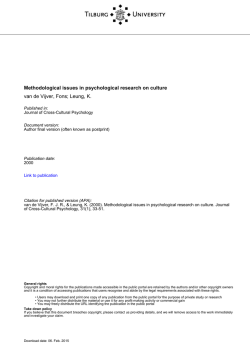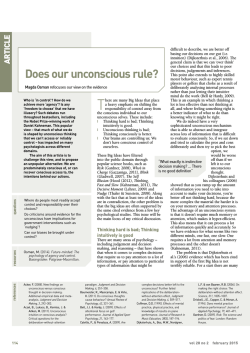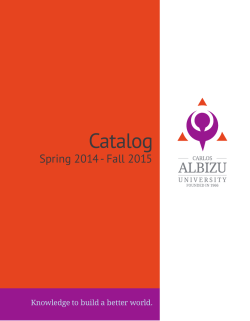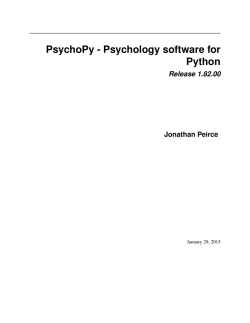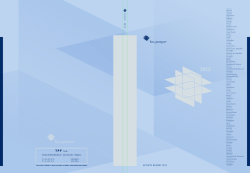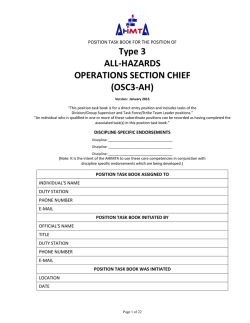
Rehabilitation Psychology 2015 Call for Proposals
American Board of Rehabilitation Psychology Division of Rehabilitation Psychology—Division 22 American Psychological Association present REHABILITATION PSYCHOLOGY 2015 17th Annual Conference Innovations in Rehabilitation Psychology FEBRUARY 26TH TO MARCH 1ST, 2015 e ApproveAp5s San Diego Marriott Mission Valley 8757 Rio San Diego Drive San Diego, CA 92108-1620 (619) 692-3800 ALL CONFERENCE INFORMATION INCLUDING REGISTRATION WILL BE COMING SOON AND AVAILABLE ON THE AMERICAN BOARD OF REHABILITATION PSYCHOLOGY WEBSITE: http://tinyurl.com/abrp-org REHABILITATION PSYCHOLOGY 2015 I nnovations in R ehabilitation P sychology Page 1 REHABILITATION PSYCHOLOGY 2015 The 17th annual Rehabilitation Psychology continuing education program is organized by the American Board of Rehabilitation Psychology (ABRP) and the Division of Rehabilitation Psychology (Division 22) of the American Psychological Association (APA). As noted on the Division 22 website, Rehabilitation Psychology is a specialty area within psychology that focuses on the study and application of psychological knowledge and skills on behalf of individuals with disabilities and chronic health conditions in order to maximize health and welfare, independence and choice, functional abilities, and social role participation across the lifespan. Please visit our website to find out more www.div22.org! Leadership has set “Engagement” as a Division 22 focus. RP15 will share this vision and work toward maximizing participation of each member of our division and in ways that are uniquely congruent and meaningful for membership through the conference theme Innovations in Rehabilitation Psychology. Program content regarding practice, research, ethics, and training will be developed by the program committee as they relate to the following thematic areas: technological advances (e.g., equipment, social media, mobile applications; virtual reality simulations, robotics); stakeholder engagement (e.g., caregivers, patients, families, providers, administration, students, business partners); and knowledge translation (e.g., practice to research, research to practice). We are excited to develop program content from which rehabilitation psychologists working with a variety of populations and within various settings can learn and collaborate! By the conclusion of this program, participants will be able to: 1. Identify current trends and learn new skills in rehabilitation psychology practice; 2. Discuss innovations in research and practice as well as their potential impact on service delivery; 3. Describe the key elements of ABPP/ABRP eligibility, the practice sample submission and review, the oral examination process, and characteristics of effective mentoring; 4. Discuss key issues for training in Rehabilitation Psychology; 5. Understand fundamental issues in ethics, cultural diversity, and evidence-based practice as applied to rehabilitation psychology. TARGET AUDIENCE: This conference is designed for psychologists in practice and/or academic settings who focus on rehabilitation with individuals having chronic diseases, impairments and / or physical and cognitive disabilities as well as for trainees (students, interns, and postdoctoral residents) with interests in rehabilitation psychology. Program content will be directed to all (i.e., basic, intermediate and advanced) skill levels. REHABILITATION PSYCHOLOGY 2015 I nnovations in R ehabilitation P sychology Page 2 REHABILITATION PSYCHOLOGY 2015 CALL FOR PROPOSALS FOR SYMPOSIA, WORKSHOPS AND PRESENTATIONS DEADLINE: AUGUST 15, 2014 RP15, Innovations in Rehabilitation Psychology, program content will work toward maximizing content variety and opportunities to learn, collaborate, and engage. A select group of submitted abstracts will be chosen. The program committee will give preference to those submissions which reflect practice, research, ethics, collaboration, and training as they relate to the following thematic areas: technological advances (e.g., equipment, social media, mobile applications; virtual reality simulations, robotics); stakeholder engagement (e.g., caregivers, patients, families, providers, administration, students, business partners); and knowledge translation (e.g., practice to research, research to practice). Division 22 places a high value on learning from and collaborating with: - Professionals at all levels (e.g.., student/trainee, early, mid, and late career) - Professionals providing rehabilitative services in a wide variety of settings (e.g., educational, inpatient, outpatient, private sector, University Hospital, Community Medical Settings, and government agencies [Department of Defense and Veterans Health Administration]) - Professionals providing rehabilitative services to a variety of populations (e.g., children, adults, stroke, TBI, SCI, burn, MS, chronic disease/illness, LGBTQ, urban, rural) - Professionals providing rehabilitative services within interdisciplinary teams Please consider submitting a proposal to RP15! We want to hear about what you are doing that embodies Innovations in Rehabilitation Psychology. Submissions reflecting the topics above, as well as innovative approaches (e.g., experiential exercise/s, audience participation, multimedia) to presenting content are highly encouraged. Submissions can request 1 to 4 hours of presentation time. Also, authors interested in submitting for a full-day (i.e., 6-8 hours) preconference (Thursday, Feb 25th) please indicate as such on the submission form. For additional information about this call, please e-mail Dr. Gina Signoracci at [email protected]. ALL OF THOSE ACCEPTED TO CONDUCT PRESENTATIONS, WORKSHOPS AND SYMPOSIA WILL RECEIVE A REDUCED REGISTRATION FEE, ARE REQUIRED TO REGISTER FOR THE CONFERENCE, AND ARE RESPONSIBLE FOR THEIR OWN EXPENSES (I.E., TRAVEL, REGISTRATION) REGISTRATION REHABILITATION PSYCHOLOGY 2015 I nnovations in R ehabilitation P sychology Page 3 STANDARD REGISTRATION FEES WHO PRECONFERENCE MAIN CONFERENCE (BY 02/01/2015) STUDENT/TRAINEE DIV 22 STUDENT/TRAINEE MEMBER DIVISION 22 MEMBER ABPP (RP) NON-MEMBER $50 $50 $100 $75 MAIN CONFERENCE (ON OR AFTER 2/2/2015 $120 $95 $125 $125 $125 $350 $350 $400 $425 $425 $475 PRESENTERS (INVITED OR PEER-REVIEWED) REGISTRATION FEES WHO PRECONFERENCE MAIN CONFERENCE (BY 02/01/2015) STUDENT/TRAINEE DIV 22 STUDENT/TRAINEE MEMBER DIVISION 22 MEMBER ABPP (RP) NON-MEMBER $50 $50 $50 $25 MAIN CONFERENCE (ON OR AFTER 2/2/2015 $70 $45 $125 $125 $125 $300 $300 $350 $375 $375 $375 REHABILITATION PSYCHOLOGY 2015 I nnovations in R ehabilitation P sychology Page 4 SUBMISSION FORM FOR SYMPOSIA, WORKSHOPS AND PRESENTATIONS Please consider my submission for the following presentation theme. Check all that apply. _____ Technological advances (e.g., equipment, social media, mobile applications; virtual reality simulations, robotics) _____ Stakeholder engagement (e.g., caregivers, patients, providers, administration, students, business partners) _____ Knowledge translation (e.g., practice to research, research to practice) Please consider my submission for the following allotted time. Check all that apply. _____ 60 Minute Presentation _____ 90 Minute Presentation _____ 2 hour symposium / workshop _____ 3 Hour symposium / workshop _____ 4 Hour symposium / workshop Please consider my submission for preconference programming (6-8 Hours). Yes _____ No_____ My submission will be for suitable the following audiences: Check all that apply. _____ Basic _____ Intermediate _____ Advanced _____ Researcher Primary Presenter: _____ Student/Trainee _____ Early Career _____ Clinician Other: Primary author/presenter name Title: Institution: e-mail address: Other Presenters: Presenter name ________ Presenter name Presenter name Presenter name Please send forms (page 4 & 5) and CV or NIH style biosketch for each presenter by August 15, 2014 to: [email protected] REHABILITATION PSYCHOLOGY 2015 I nnovations in R ehabilitation P sychology Page 5 Symposia, Workshop, Presentation Abstract (Please respond to all headings below. Responses to additional items are not included in the 500 word limit.) Abstract (Not to exceed 500 words): Describe how the symposia, workshop, presentation will contribute to the conference theme of Innovations in Rehabilitation Psychology: Please describe what, if any, innovative approaches (e.g., experiential exercise/s, audience participation, multimedia) will be implemented to present content (Highly encouraged, but not required. Indicate N/A if presenter/s plan to use standard PowerPoint or similar program/lecture format only): References (Encouraged, but not required. Indicate N/A if necessary): Learning Objectives (3-4 for a 1-4 hour program, 6-8 for a 5-8 hour program)* 1. 2. 3. ____________________________________________________________________________________________________________________ 4. ____________________________________________________________________________________________________________________ 5. ____________________________________________________________________________________________________________________ 6. ____________________________________________________________________________________________________________________ 7. ____________________________________________________________________________________________________________________ 8. ____________________________________________________________________________________________________________________ *Guide to Writing Learning Objectives can be found on the last page of this document REHABILITATION PSYCHOLOGY 2015 I nnovations in R ehabilitation P sychology Page 6 CALL FOR SCIENTIFIC POSTER PRESENTATIONS Deadline: October 31, 2014 The Program Committee of the 17th Annual Conference “Rehabilitation Psychology 2015” invites you to submit a Scientific Poster Presentation reflecting original empirical research, novel interventions, innovative program development, or other topics relevant to the practice of rehabilitation psychology. Research that is incomplete at the time of the submission may be submitted under the assumption that the data will be complete and ready for presentation by the time of the conference. Posters submissions that are purely conceptual (e.g. proposing ideas for future studies or interventions) will not be considered for acceptance. Select trainee poster submissions will be invited to present an oral paper. Please indicate below if you would like to be considered to present an oral paper presentation. Please take great care in preparing your presentation abstract as the criteria for acceptance is increasingly selective. We will select award finalists based on the quality of the poster abstracts. Poster/Presentation Title: ___________________________________________________________________________________________ Primary presenter: Primary presenter name: Institution: e-mail address: Other presenters: List: Are you a student or trainee? Yes No Students/trainees: Would you like your poster to also be considered for an oral presentation? *A small selection of posters will be chosen for oral presentation and will be eligible for the student presentation award. Yes No Please submit forms (pages 6 & 7) and abstracts electronically to Eun-Jeong Lee, PhD at [email protected] no later than October 31, 2014. Please contact Dr. Lee with any questions. ALL OF THOSE ACCEPTED TO CONDUCT ORAL PAPER AND POSTER PRESENTATIONS WILL RECEIVE A REDUCED REGISTRATION FEE, ARE REQUIRED TO REGISTER FOR THE CONFERENCE, AND ARE RESPONSIBLE FOR THEIR OWN EXPENSES (I.E., TRAVEL, REGISTRATION) REHABILITATION PSYCHOLOGY 2015 I nnovations in R ehabilitation P sychology Page 7 Scientific Poster Presentation Abstract (Not to exceed 500 words and include headings below). Please ensure that your abstracts are de-identified, using no identifying author, affiliation, and/or institution information in the abstract itself. Title: Objective: Design: Setting: Participants: Main Outcome Measure/s: Results: Conclusions: Key Words (3 to 4 words or phrases): REHABILITATION PSYCHOLOGY 2015 I nnovations in R ehabilitation P sychology Page 8 Guide to Writing Learning Objectives • Learning objectives clearly describe what the learner will know or be able to do as a result of having attended an educational program or activity (“The learner will be able to define, recite, identify, describe, etc.”). • Learning objectives must be observable and measurable. • Learning objectives should (1) focus on the learner, and (2) contain action verbs that describe measurable behaviors • • Verbs to USE: • list, describe, recite, write • compute, discuss, explain, predict • apply, demonstrate, prepare, use • analyze, design, select, utilize • compile, create, plan, revise • assess, compare, rate, critique • Verbs to AVOID • know, understand • learn, appreciate • become aware of, become familiar with Acceptable learning objectives effectively tie the knowledge gains associated with your program to the functioning of the attendees and highlight the professional and scientific gains that would be expected to accrue as a result of the program. Example of well-written learning objectives: Upon completion of this session, the participant will be able to: • Discuss basic hypnosis theory and technique • List differences between acute and chronic pain • Utilize hypnosis in controlling acute pain • Apply post-hypnotic suggestions to chronic pain REHABILITATION PSYCHOLOGY 2015 I nnovations in R ehabilitation P sychology Page 9
© Copyright 2026
